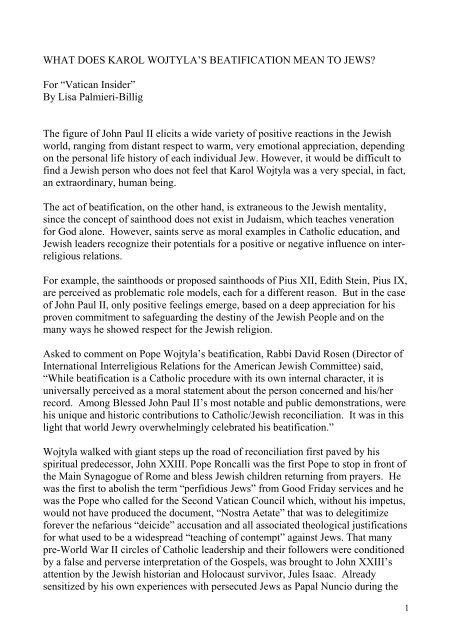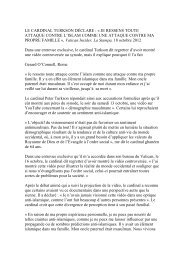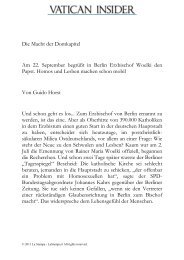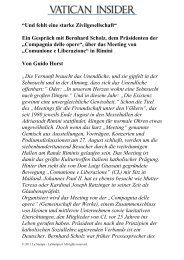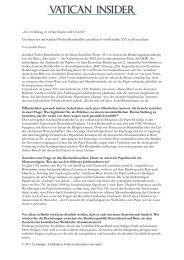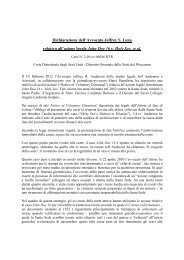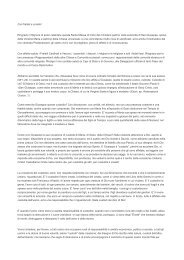KAROL WOJTYLA_EBREI - Vatican Insider
KAROL WOJTYLA_EBREI - Vatican Insider
KAROL WOJTYLA_EBREI - Vatican Insider
Create successful ePaper yourself
Turn your PDF publications into a flip-book with our unique Google optimized e-Paper software.
WHAT DOES <strong>KAROL</strong> <strong>WOJTYLA</strong>’S BEATIFICATION MEAN TO JEWS?<br />
For “<strong>Vatican</strong> <strong>Insider</strong>”<br />
By Lisa Palmieri-Billig<br />
The figure of John Paul II elicits a wide variety of positive reactions in the Jewish<br />
world, ranging from distant respect to warm, very emotional appreciation, depending<br />
on the personal life history of each individual Jew. However, it would be difficult to<br />
find a Jewish person who does not feel that Karol Wojtyla was a very special, in fact,<br />
an extraordinary, human being.<br />
The act of beatification, on the other hand, is extraneous to the Jewish mentality,<br />
since the concept of sainthood does not exist in Judaism, which teaches veneration<br />
for God alone. However, saints serve as moral examples in Catholic education, and<br />
Jewish leaders recognize their potentials for a positive or negative influence on interreligious<br />
relations.<br />
For example, the sainthoods or proposed sainthoods of Pius XII, Edith Stein, Pius IX,<br />
are perceived as problematic role models, each for a different reason. But in the case<br />
of John Paul II, only positive feelings emerge, based on a deep appreciation for his<br />
proven commitment to safeguarding the destiny of the Jewish People and on the<br />
many ways he showed respect for the Jewish religion.<br />
Asked to comment on Pope Wojtyla’s beatification, Rabbi David Rosen (Director of<br />
International Interreligious Relations for the American Jewish Committee) said,<br />
“While beatification is a Catholic procedure with its own internal character, it is<br />
universally perceived as a moral statement about the person concerned and his/her<br />
record. Among Blessed John Paul II’s most notable and public demonstrations, were<br />
his unique and historic contributions to Catholic/Jewish reconciliation. It was in this<br />
light that world Jewry overwhelmingly celebrated his beatification.”<br />
Wojtyla walked with giant steps up the road of reconciliation first paved by his<br />
spiritual predecessor, John XXIII. Pope Roncalli was the first Pope to stop in front of<br />
the Main Synagogue of Rome and bless Jewish children returning from prayers. He<br />
was the first to abolish the term “perfidious Jews” from Good Friday services and he<br />
was the Pope who called for the Second <strong>Vatican</strong> Council which, without his impetus,<br />
would not have produced the document, “Nostra Aetate” that was to delegitimize<br />
forever the nefarious “deicide” accusation and all associated theological justifications<br />
for what used to be a widespread “teaching of contempt” against Jews. That many<br />
pre-World War II circles of Catholic leadership and their followers were conditioned<br />
by a false and perverse interpretation of the Gospels, was brought to John XXIII’s<br />
attention by the Jewish historian and Holocaust survivor, Jules Isaac. Already<br />
sensitized by his own experiences with persecuted Jews as Papal Nuncio during the<br />
1
war, Roncalli immediately accepted the imperative that the disparaging theological<br />
and social atmosphere which enabled Nazi anti-Semitism to take root and lead to the<br />
tragedy of the Shoah, had to be changed and abolished, once and for all.<br />
The Polish Pope elected nearly two decades later, was also a personal witness of the<br />
Holocaust. He could not halt the persecution, deportation and decimation of his<br />
Jewish classmates, who comprised about one fourth of the entire student body in<br />
Wadowice, Karol Wojtyla’s home town. These painful wartime memories, along with<br />
his joyful recollections of “Friday afternoons, Sabbath candles in the windows,<br />
psalms being sung, children’s voices….” (as he recalled to an AJC delegation in<br />
1990). together with his intimate religious conviction that the Jewish People are “the<br />
dearly beloved elder brothers of the ancient covenant never broken and never to be<br />
broken” and that the Holocaust was “the worst trauma of the 20 th century, and<br />
Christians and Jews must work together to make sure it never happens again” (as he<br />
said in 1994 to Rabbi David Rosen and myself during a private audience in Assisi<br />
following our participation in an interreligious prayer for the Balkans) constituted the<br />
psychic background that compelled John Paul II to move forward with determination,<br />
knocking down one barrier after another.<br />
His historic visit to Rome’s Main Synagogue and lifelong friendship with Chief<br />
Rabbi Elio Toaff, his calling a Summit of world religious leaders to pray for peace in<br />
Assisi, his unconventional personal intervention in the Auschwitz Carmelite Convent<br />
dispute, his decision to open diplomatic relations with Israel, his pilgrimage to the<br />
Jewish State and his unforgettable act of penance in slipping a prayer into the<br />
Western Wall asking forgiveness for the harm done by the “sons and daughters of the<br />
Church” to “the children of Abraham”, his countless visits to Jewish communities<br />
during his travels – are but a small part of the long list of John Paul II’s public actions<br />
aimed at communicating his – and the Catholic Church’s -- commitment to a new<br />
relationship between religions and above all, between Catholics and Jews.<br />
“<strong>Vatican</strong> <strong>Insider</strong>” contacted many Jewish friends in different walks of life to hear<br />
their spontaneous reactions to John Paul II’s recent beatification. Their responses<br />
were very similar, despite their different levels of familiarity with the history of<br />
Catholic-Jewish relations.<br />
David Gerbi, an Italian Jewish Jungian psychologist of Libyan origin, said that as a<br />
Jew he is unable to conceptualize the religious values attributed to beatification - just<br />
as he is unable to understand the religious significance of a Muslim’s pilgrimage to<br />
Mecca - but as an Italian citizen he recognizes that John Paul II fully merited<br />
international acclaim. “The Jewish world is moved by his many conciliatory gestures<br />
and especially his friendship with Rome’s former Chief Rabbi, Elio Toaff, who<br />
received the Pope in the Main Synagogue and who is mentioned in John Paul II’s<br />
Testament together with only two other people. John Paul II’s openings to the Jewish<br />
2
People were inclusive and revolutionary. He was the first Pope in history to have<br />
travelled the short distance across the Tiber to enter a synagogue.”<br />
Ariel Dumont, a French Jewish journalist living in Rome, who also admits the<br />
beatification has no personal meaning for her, believes that this ceremony also served<br />
a political function in distracting people’s attention from the current problems and<br />
scandals plaguing the Catholic Church. However, she too feels that John Paul II was<br />
“highly charismatic, a master of communication and that his papacy was of great<br />
political importance. I remember his eyes,” she recalls, “his expression when I saw<br />
him during World Youth Day – so warm and engaging.”<br />
The Vienna born rabbi, Arthur Schneier, who received John Paul II in his Park East<br />
Synagogue in New York in 2008, also stresses the political aspects of the Wojtyla<br />
papacy, recalling the joint efforts of Schneier’s Appeal of Conscience Foundation and<br />
the <strong>Vatican</strong> in working towards religious freedom in the former Soviet Union and<br />
Eastern Europe. “John Paul II was very sensitive to Jewish suffering related to the<br />
Shoah, and made major contributions to Catholic-Jewish relations by recognizing<br />
Israel, reconfirming the ‘Nostra Aetate’ guidelines. and being outspoken in<br />
condemning anti-Semitism as a Sin against God and Man.”<br />
Daria Nahum, who directs the Jewish bookshop near the Rome Synagogue recalls<br />
that the commemoration of John Paul II’s beatification organized by the City of<br />
Rome in the Auditorium was attended by a substantial delegation of the Jewish<br />
Community, headed by Chief Rabbi Riccardo Di Segni who spoke in Wojtyla’s<br />
honor. “I have no feelings regarding his beatification, but John Paul II was certainly a<br />
distinguished, memorable, exceptional human being.” She added as an afterthought<br />
“Perhaps if I were Catholic, I would be disturbed about the Church’s cover-ups of the<br />
pedophile scandals that took place throughout all the papacies.”<br />
Prof. Giacomo Saban, who emigrated to Rome from Istanbul, formerly taught<br />
Mathematics at Rome University and served as President of the Rome Jewish<br />
Community during John Paul II’s historic visit to the Synagogue in 1986, recalls that<br />
“the simple fact – the image itself - of his visit, of his embrace with Chief Rabbi<br />
Toaff, shattered an age-old stereotype of Jews being ‘cursed’ and ‘untouchable’. John<br />
Paul II had enormous charisma. He made a big impression on the young people in<br />
the Synagogue. They were all very impressed by his smile and way of talking. He<br />
was very sincere about his wish to improve relations between Catholics and Jews.”<br />
Because beatification is not a Jewish concept, most Jewish leaders observed the<br />
beatification event at St. Peter’s last May 1 from a distance, with silent approval.<br />
Some, however, wished to openly express their esteem by attending the ceremony.<br />
Most notably, the State of Israel sent a delegation accompanied by Israel’s<br />
Ambassador to the Holy See, Mordechay Lewy and led by Minister Yossi Peled, a<br />
Holocaust survivor saved by a Belgian Catholic family. The delegation also included<br />
3
Ambassador Bahig Mansour, Director of Israel’s Department of Interreligious<br />
Affairs.<br />
Minister Peled declared that as a survivor, he found John Paul II’s beatification<br />
“particularly significant”.<br />
“This man”, he said, “born in a period of publicly approved anti-Semitism, stood up<br />
and challenged those who wanted to subjugate the spirit of the human race.”<br />
Referring to the Pope’s trip to Israel, he said, “The image of his encounter with his<br />
childhood friends in Poland is still fresh in my mind.” Recalling John Paul II’s prayer<br />
for forgiveness at the Western Wall and his decision to initiate diplomatic relations<br />
with Israel, Minister Peled said John Paul II “made possible the start of a new<br />
relationship between Christians and Jews. Probably no other man is more fitting to<br />
represent the true spirit of Christianity” he concluded.<br />
Others who attended the May 1 ceremony were Prof. Marco Morselli co-president of<br />
the Rome Jewish Christian Friendship Association, in representation of Rome’s Chief<br />
Rabbi Riccardo Di Segni; myself as AJC’s Liaison to the Holy See and in<br />
representation of Rabbi David Rosen, AJC’s Director of International Interreligious<br />
Affairs; and the renowned conductor, Sir Gilbert Levine, who was a personal friend<br />
of John Paul II.<br />
“His Holiness John Paul II was the most inspiring, the most generous patron any<br />
artist could imagine” said Sir Gilbert. “I was privileged to create and conduct<br />
numerous concerts with his direct creative and spiritual impetus and support, at the<br />
<strong>Vatican</strong> and in great cities around the world, for more than 17 years – concerts<br />
intended by His Holiness to bring adherents of all the world’s diverse religions<br />
together in peace and harmony. The most historic of these were his Papal Concert to<br />
Commemorate the Shoah of 1994 and the Papal Concert of Reconciliation of 2004.”<br />
Pope Wojtyla and he, Sir Gilbert Levine recalls, “prayed together, conversed<br />
together, smiled together, with him teaching me more about the world than I could<br />
ever hope to learn, deepening my Jewish faith all the while. A relationship that<br />
ennobles my art immeasurably to this day.”<br />
Sir Levine also believes that John Paul II performed “a living ‘miracle’, by bringing<br />
hope and light back into the life of my mother-in-law Margit Raab-Kalina who had<br />
witnessed the murder of her entire family during the Shoah. He first met Margit in<br />
1988, prayed for her, and reached into Margit’s soul, bringing her his profound<br />
human understanding and love, over the more than nine years they knew each other. I<br />
miss the Blessed Pope John Paul, as does the whole world – Christian and non-<br />
Christian alike. For me, he was, as they acclaimed at his funeral ‘Santo Subito’. His<br />
rise to the altar is the inexorable answer to the prayers of all the world.”<br />
4
The story of this rather unique friendship can be read in the conductor’s<br />
autobiographic book, “The Pope’s Maestro.”<br />
John Paul II had other close Jewish friends, such as his childhood classmate, Jerzy<br />
Kluger, who lives in Rome and regularly came to visit him.<br />
Between the Pope and former Chief Rabbi Elio Toaff, there was “a special feeling”,<br />
as Rabbi Di Segni recalls. Toaff who turned 96 on May 1, the very day of Karol<br />
Wojtyla’s beatification, contributed words of praise to the May 3 issue of<br />
“L’Osservatore Romano.” They are worth recalling.<br />
“The memory of Karol Wojtyla will remain indelible in the collective memory of the<br />
Jewish People with his call for brotherhood and for a spirit of tolerance foreign to all<br />
violence.<br />
“In the troubled history of relations between Popes and Jews”, he continued, “in the<br />
shadow of the ghetto in which Jews were enclosed for over three centuries in<br />
humiliating and depressing conditions, his image emerges in all its resplendent<br />
exceptionality. In the relations between our great religions, in this new century<br />
already sullied with barbaric wars and the plague of racism, the heritage of John Paul<br />
II remains one of the few spiritual islands guaranteeing the survival and spiritual<br />
progress of mankind.”<br />
“L’Osservatore Romano” also published a tribute to John Paul II’s beatification by<br />
Rome’s present Chief Rabbi, Dr. Riccardo Di Segni.<br />
“A Jewish view must necessarily distinguish the human values demonstrated by this<br />
Pope from any theological consideration that might still separate us” he wrote.<br />
“John Paul II brought about a revolution, breaking down the thousand year old wall<br />
of diffidence against the Jewish world. He conveyed a great sentiment of sympathy.<br />
His visit to the Synagogue of Rome, to Israel, his initiating diplomatic relations with<br />
the Jewish State, were fundamental steps. Obviously, the process of beatification is<br />
totally extraneous to the Jewish mentality, but we must conceive this great day in<br />
Rome in honor of John Paul II as an important manifestation of religious sentiment, a<br />
fact that demonstrates how religious sentiment is a necessity felt by millions of<br />
citizens.”<br />
Later, Rabbi Di Segni added , “This Pope was able to break the ice and today we all<br />
realize that his gesture has forever changed the atmosphere of our relations.”<br />
Rabbi James Rudin, AJC’s Senior Interreligious Adviser, gets straight to the point in<br />
commenting on the beatification in an article for Religious News Service<br />
paradoxically entitled, “John Paul II, the Jewish Saint”.<br />
5
“When the <strong>Vatican</strong> beatifies someone and places the person just one step away from<br />
sainthood, it usually attracts scant attention among Jews because it is correctly<br />
perceived as an internal church process” wites Rabbi Rudin. “But the recent<br />
beatification – and likely canonization – of the late Pope John Paul II is different.<br />
The Jewish community remembers the Polish-born Karol Wojtyla as the best Pope<br />
the Jews ever had. As he moves along the path to sainthood, Jews are among those<br />
cheering him on” .<br />
“The tragedy of the Holocaust and a warm personal relationship with Jews were both<br />
etched into the Pope’s head and heart” Rudin continues. “During the 27 – year<br />
pontificate John Paul’s positive actions earned him an honoured place in Jewish<br />
history.”<br />
6


